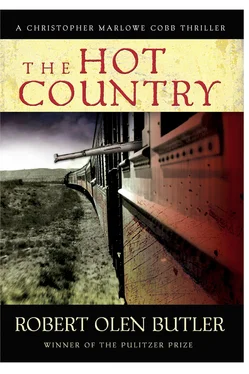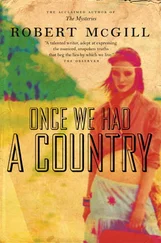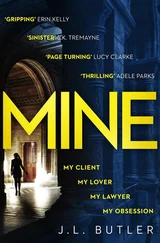When he had all the papers again, Funston said, “Not from my mouth, boys, but you can find the President on the recent record saying how the Mexicans would certainly welcome us with open arms if we ever intervened. How they’d all understand that we were actually saving them from their latest tyrant. How in no time at all they’d create their own little old democracy down here and be grateful to us for giving them the chance.”
The parrot began to sing “La Cucaracha,” the stretch of lyric he’d learned coming from the pre-revolutionary version, which was still, in fact, about a cockroach. La cucaracha, la cucaracha, ya no puede caminar . The cockroach can’t walk anymore.
Funston seemed to ignore this. “Not that these folks don’t deserve a democracy,” he said. “Everyone does. But they don’t understand what we’re offering. We learned in the Philippines that you can’t create a democracy for savages unless you have complete control over them.”
The bird started over and got farther into the lyric: porque no tiene, porque le falta, las dos patitas de atrás. Because he’s lacking his two back legs.
Funston may have been ready to spell it all out: that we were expected to rally the United States to a major military action, total invasion. Maybe not. This may have been his intended stopping point anyway. The implication was inescapably clear as it was. But after his declaration about how to bring democracy to savages, he paused for a moment, and then he said, “Pardon me, gentlemen.” He rose and vanished into the other room and very briefly the parrot fell silent. Then the parrot cried, “About face.” Then there was only the faintest sound of a fluttering of feathers. And then silence.
We did not hear the bird again for all the rest of the time we lingered, milling about the courtyard with more Scotch and more cigarettes and a more relaxed General Funston. He made a point of working his way around the room to each of us.
When he got to me, he said, “Glad you’ve come down here, Cobb.”
We were standing near a dry fountain in the center of the courtyard and the other reporters were out of earshot, talking and laughing among themselves, more than halfway vanished into a good-Scotch ground fog. I could have asked questions now, could have found out if Funston knew who the new German in town might be. But I felt certain this would be news to him. He just didn’t seem useful to me at the moment. And till I had this story, whatever it was, I wanted to keep it to myself as much as possible.
“I’m not sure I’m glad,” I said.
He cocked his head slightly at me. Why did it remind me of a parrot cocking its head? Hearing words and being interested in them but not understanding.
“Like you,” I said, “I came for a war.”
He cuffed me on the shoulder. “There you go,” he said.
We each had a Scotch in our hand. We each took a sip.
“You know, I adore your mother,” he said.
This happens to me quite often. I’ve generally gotten used to it. I learned long ago how to prevent even the first little sharp-toothed nibble of a troubling thought from getting at me, learned to assume that such declarations as this by a man are simply from an ardent fan on the other side of the proscenium. “Fearless Freddie” Funston, however, his face looking up into mine almost dreamily, his beard and mustache trimmed tightly close in what was neither a man’s shaved face nor a man’s proper beard, this man Funston troubled me. “Scrapping Fred” was an actor in his own way, and on a very big stage, and with an impressive costume. My mother could have fallen for him because of all of that.
“I saw her at the Morosco in San Francisco the year before the earthquake,” he said.
I was gone from her daily life by then. I needed to stop this line of thought or it would drive me nuts.
“What was the play?” Funston was thinking aloud.
“Were you stationed there?” I asked him, trying to divert the conversation.
“‘ The Eternal Feminine, ’” he said.
“The Presidio?” I asked.
“That was it,” he said. “‘ The Eternal Feminine .’ Your mother was splendid.”
“You served there?”
“The Presidio,” he said. “That’s right. I was commander.”
“This is good Scotch,” I said, starting to lift my glass, intending to take the rest of whatever was in there as a quick bolt and excuse myself from him to get some more.
“My wife and I loved the theater in Frisco,” he said.
I pulled my glass down for the moment.
“But your mother was the highlight. For both of us.”
“Thank you,” I said.
“So sad, the next year,” he said. “The Morosco and all the rest were rubble.”
Mother was long gone from Frisco by then. She was back in New York.
“I took over in the aftermath, you know,” Funston said. “Ran the show.”
I’d read about the downright admiration San Franciscans developed for Funston. With the water mains broken, he created a successful firebreak by dynamiting the homes of the city’s elite. He fought the rats and disease. And he had looters shot dead on the spot.
“My task here is not dissimilar,” he said. “The streets are open sewers. Insects and vermin live with these people unchecked. For every thousand Veracruzians, fifty die each month and more than half of those are infants. It breaks my heart. They’re dying of dysentery, malaria, TB, meningitis, smallpox. I’m going to fix that. America is going to fix that.”
And I knew we would. I took the bolt of Scotch. I let this complicated little man blur before me.
It was darkly shadowed at the doorway to my rooms and I’d had too much Scotch and too many cigarettes and too much war-correspondent gab and too much military point of view but especially too much Scotch and too much darkness and so Diego startled the bejesus out of me when he slipped from the shadows and slid something smoothly leathery into my hand and said, “He never felt a thing.” He tried to vanish again but I recovered quick and though my reflexes may have been a little dulled by the Scotch I still caught him by his collar and hauled him back to me.
“Okay,” he said. “Okay. Now you got me, you can give me that silver dollar. Scarface’s wallet with his train ticket is worth a dollar.”
“His wallet?”
“In your right hand.”
My right hand was actually still holding Diego’s collar. He realized that.
“Wait,” he said. “Your left hand? Maybe your pocket? You’re quick with your hands, Kit. You said I can call you ‘Kit,’ right? I remember my dad being quick with his hands.”
His papi.
“How is it I’ve turned you into a little smart-ass, Diego Cordero Medina Espinoza?”
“You think it took America invading to make me a smart-ass? I am my own smart-ass, Kit.”
“Don’t call me that,” I said.
“Mr. Cobb.”
“Don’t call me that.”
“ Papi. ”
I still had him by the collar and I opened my door and pulled him inside and shoved him — though gently — in the direction of the desk chair.
“Don’t call me that,” I said.
I turned on the overhead electric light.
“Okay, boss,” he said in English.
Now he was sitting in the chair like an obedient kid in the front row at school.
It was in my left hand, actually. “You nicked this from the man with the scar?” I used the English verb from the street in the midst of the Spanish question.
“‘Nicked’?” he asked.
“A little American language lesson,” I said. “Pickpockets,” I said slowly, clearly, in English, “nick leather.” And I held up the wallet with the last word.
Читать дальше












